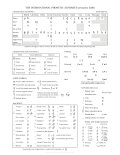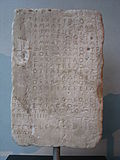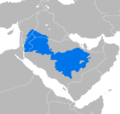In linguistics, a koine or koiné language or dialect (pronounced /ˈkɔɪneɪ/; from Ancient Greek κοινή 'common') is a standard or common dialect that has...
14 KB (1,588 words) - 14:17, 17 October 2024
Ελληνιστική Κοινή, "Hellenistic Koiné", in the sense of "Hellenistic supraregional language"). Ancient scholars used the term koine in several different senses...
43 KB (4,881 words) - 16:40, 4 November 2024
and Roman antiquity Koiné language, a supra-regional form of any language Standard Modern Greek, sometimes called "modern Koiné" The Yoruba language...
504 bytes (95 words) - 12:13, 12 July 2024
Jewish Koine Greek, or Jewish Hellenistic Greek, is the variety of Koine Greek or "common Attic" found in numerous Alexandrian dialect texts of Hellenistic...
10 KB (1,465 words) - 20:21, 16 September 2024
Bonin English (section Ogasawara Japanese Koiné)
English, Bonin Standard English. Before World War II, Ogasawara Japanese Koiné was a koineized form of Japanese spoken among Japanese islanders who spoke...
8 KB (919 words) - 11:29, 21 July 2024
Koine Greek grammar is a subclass of Ancient Greek grammar peculiar to the Koine Greek dialect. It includes many forms of Hellenistic era Greek, and authors...
9 KB (1,109 words) - 06:14, 20 February 2023
Southern Italian koiné was a koiné language that had evolved due to contact between Naples, Amalfi, Salerno and other ports. It was spread by the Normans...
827 bytes (72 words) - 21:48, 27 February 2022
Dano-Norwegian (Danish and Norwegian: dansk-norsk) was a koiné/mixed language that evolved among the urban elite in Norwegian cities during the later...
10 KB (1,006 words) - 06:00, 29 October 2024
Aka-Jeru language (section Great Andamanese koiné)
attributive and predicative meaning. The Great Andamanese koiné has a seven-vowel system. Koiné vocabulary:[clarification needed] Column in yellow denotes...
17 KB (762 words) - 01:40, 21 July 2024
Yoruba language (redirect from Yoruba koiné)
changed to [ɪ:] Literary Yoruba, also known as Standard Yoruba, Yoruba koiné, and common Yoruba, is a separate member of the dialect cluster. It is the...
49 KB (4,957 words) - 18:48, 8 November 2024
during the centuries that followed a vernacular form of Greek, known as koine, and Greek culture was spread, while the Greeks adopted Eastern deities...
286 KB (25,842 words) - 23:36, 8 November 2024
1 Esdras (redirect from Koine Ezra)
1 Esdras (Greek: Ἔσδρας Αʹ), also Esdras A, Greek Esdras, Greek Ezra, or 3 Esdras, is the ancient Greek Septuagint version of the biblical Book of Ezra...
16 KB (1,930 words) - 23:47, 26 October 2024
of Rome and Koine Greek became the first or second language in the Roman Empire. The origin of Christianity can also be traced through Koine Greek because...
68 KB (6,907 words) - 14:54, 7 November 2024
Mandarin Chinese (section Late imperial koiné)
were often mutually unintelligible, these officials communicated using a koiné language based on various northern varieties. When Jesuit missionaries learned...
85 KB (8,800 words) - 23:51, 26 October 2024
Parisian Quebec Galician German Standard Bernese Greek Standard Modern Ancient Koine Greenlandic Gujarati Hawaiian Hebrew Modern Biblical Tiberian Samaritan...
164 KB (15,952 words) - 02:23, 7 November 2024
Achaean Doric Greek (redirect from Achaean Doric Koine)
Press. Colvin, Stephen C. 2007. A historical Greek reader: Mycenaean to the koiné. Oxford: Oxford University Press. Horrocks, Geoffrey. 2010. Greek: A history...
4 KB (445 words) - 16:55, 22 July 2024
From the Hellenistic period (c. 300 BC), Ancient Greek was followed by Koine Greek, which is regarded as a separate historical stage, though its earliest...
48 KB (5,243 words) - 00:41, 6 November 2024
NKo (ߒߞߏ) is a standardized unified koiné form of several Manding languages written in the NKo alphabet. It is used in Guinea, Guinea-Bissau, Mali, Ivory...
6 KB (556 words) - 23:02, 6 September 2024
Christianity (category Articles containing Koinē Greek-language text)
South Asia. Early Jewish Christians referred to themselves as 'The Way' (Koinē Greek: τῆς ὁδοῦ, romanized: tês hodoû), probably coming from Isaiah 40:3...
299 KB (31,571 words) - 03:27, 6 November 2024
Haymanot Humanistic Culture Languages Hebrew Biblical Yiddish Yeshivish Jewish Koine Greek Yevanic Judeo-Tat Shassi Judaeo-Iranian Judaeo-Spanish Judeo-Gascon...
154 KB (17,225 words) - 20:34, 4 November 2024
Modern Greek (redirect from Modern Greek Koine)
varieties of Modern Greek that followed a common evolutionary path from Koine and have retained a high degree of mutual intelligibility to the present...
31 KB (3,241 words) - 21:34, 22 October 2024
The royal courts of the Ming and early Qing dynasties operated using a koiné language known as Guanhua, based on the Nanjing dialect of Mandarin. Standard...
84 KB (8,874 words) - 02:06, 8 November 2024
Suret language (redirect from Iraqi Koine)
needed] Iraqi Koine is a merged dialect which formed in the mid-20th century, being influenced by both Urmian and Hakkari dialects. Iraqi Koine, like the...
95 KB (8,709 words) - 15:12, 7 November 2024
often this lexifier is not modern French but rather a 17th- or 18th-century koiné of French from Paris, the French Atlantic harbors, and the nascent French...
7 KB (844 words) - 06:38, 4 November 2024
James the Great (Koinē Greek: Ἰάκωβος, romanized: Iákōbos; Aramaic: ܝܥܩܘܒ, romanized: Yaʿqōḇ; died AD 44) was one of the Twelve Apostles of Jesus. According...
25 KB (2,457 words) - 18:06, 7 November 2024
Hilal Algerian koiné Judeo-Algerian Algerian Saharan Eastern Algerian Eastern Hilal Tunisian koiné Maqil Fessi Hassaniya Nemadi Moroccan koiné Eastern Western...
19 KB (2,152 words) - 04:46, 24 October 2024
Common sense (redirect from Koine ennoia)
sensibles" (or "common perceptibles"). In this discussion, "common" (κοινή, koiné) is a term opposed to specific or particular (idia). The Greek for these...
89 KB (11,529 words) - 04:36, 24 October 2024
and the use of Koiné Greek and Latin as liturgical languages replacing Biblical Hebrew. The word synagogue comes from Jewish Koine Greek, a language...
36 KB (4,331 words) - 00:37, 7 November 2024
continuum. Ticinese koiné refers instead to a koiné form used by speakers of local dialects (particularly those diverging from the koiné itself, as, e.g....
8 KB (733 words) - 13:49, 25 January 2024
Lhasa dialect is used as a lingua franca in Ü-Tsang and the Tibetan Exile koiné language is also based largely on it. Wikimedia Commons has media related...
4 KB (444 words) - 06:27, 7 August 2024














